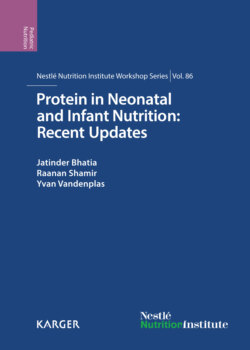Protein in Neonatal and Infant Nutrition: Recent Updates

Реклама. ООО «ЛитРес», ИНН: 7719571260.
Оглавление
Группа авторов. Protein in Neonatal and Infant Nutrition: Recent Updates
Nestlé Nutrition Institute Workshop Series
Protein in Neonatal and Infant Nutrition: Recent Updates
Contents
Preface
Foreword
Contributors
Proteins, Peptides and Amino Acids: Role in Infant Nutrition
Abstract
Proteins, Peptides and Amino Acids: Definitions
Protein Needs in Infancy
Breast Milk
Infant Formula
Specialized Infant Formula for Specific Needs
Conclusion
Disclosure Statement
References
Hydrolyzed Proteins in Allergy
Abstract
Introduction
Cow’s Milk Allergy
Cow’s Milk Proteins
Hydrolyzed Formulas
Partially and Extensively Hydrolyzed Formulas
Prevention of Allergy
Target Population: Who Is the High-Risk Infant?
Partially Hydrolyzed Formulas
Partially versus Extensively Hydrolyzed Formulas
Other Formulas
Treatment of Allergy
Partially Hydrolyzed Formulas
Extensively Hydrolyzed Formulas
Rice-Based Extensively Hydrolyzed Formulas
Other Formulas
Acquisition of Tolerance
Nutritional Value
Conclusion
Disclosure Statement
References
Infant Formula with Partially Hydrolyzed Proteins in Functional Gastrointestinal Disorders
Abstract
Introduction
Definition of Partially Hydrolyzed Formulas
Partially Hydrolyzed Formulas and Regurgitation
Partially Hydrolyzed Formulas and Infantile Colic
Partially Hydrolyzed Formula and Constipation
Discussion
Disclosure Statement
References
Hydrolyzed Proteins in Preterm Infants
Abstract
Introduction
Nutritional Adequacy
Gastrointestinal Transit Time and Feeding Tolerance
Prevention of Allergic Diseases
Conclusion
Disclosure Statement
References
Hydrolyzed Formula for Every Infant?
Abstract
Introduction
Definitions and Allergenicity. Hydrolysis
Hypoallergenicity
Clinical Aspects
Nutrition and Growth
Metabolism and Absorption
Gastrointestinal Symptoms
Allergy Prevention
Breastfeeding versus Hydrolyzed Formulas
Intact Protein Formula versus Hydrolyzed Formula
Partially versus Extensively Hydrolyzed Formulas
Cost Analysis
Conclusions
Disclosure Statement
References
The Benefits of Breast Feeding
Abstract
Introduction
Infections
Neurodevelopmental Outcome
Obesity
Allergy
Celiac Disease as a Model for Autoimmune Disorders
Closing Remarks
Disclosure Statement
References
Protein Evolution of Human Milk
Abstract
Introduction
Materials and Methods. Human Milk Collection from Mothers
Protein Content of Human Milk by Mid-Infrared Analyzer
Protein Content of Human Milk Assessed by the Bicinchoninic Acid Kit
Statistical Analyses
Results. Demographics and Anthropometrics of the Study Subjects
Comparison of Analytical Methods to Determine Total Protein in Human Milk
Protein Content of Human Milk
Discussion
Disclosure Statement
References
Metabolic Programming: Effects of Early Nutrition on Growth, Metabolism and Body Composition
Abstract
Growth and Protein Requirements during the First 1,000 Days
Protein Intake - Long-Term Outcomes and Biomarkers
Body Composition
Conclusions
Acknowledgment
Disclosure Statement
References
Human Milk: Bioactive Proteins/Peptides and Functional Properties
Abstract
Introduction
Assessment of Bioactivities of Human Milk Proteins/Peptides
Digestive Fate of Milk Proteins/Peptides
Milk Proteins That Can Act in Intact Form. Secretory IgA
Lactoferrin
Lysozyme
Bile Salt-Stimulated Lipase
Milk Fat Globule Membranes
Proteins That Can Act after Forming Bioactive Peptides. α-Lactalbumin
β-Casein
κ-Casein
Osteopontin
Formation/Digestion of Milk Peptides - Physiological Implications
Breastfed Infants
Infants Fed Hydrolyzed Formula
Disclosure Statement
References
Human Milk for Preterm Infants and Fortification
Abstract
Introduction
Fortification of Human Milk
Disclosure Statement
References
Protein Needs of Preterm Infants: Why Are They So Difficult to Meet?
Abstract
Introduction
Conclusion
Disclosure Statement
References
Optimizing Early Protein Intake for Long-Term Health of Preterm Infants
Abstract
Introduction
Underlying Concepts for Feeding the Premature Infant
Protein Intake and Later Neurocognitive Development
Protein Intake and Later Growth and Bone Health
Protein Intake and Later Risk Factors for Cardiovascular Disease
Overview
Disclosure Statement
References
Defining Protein Requirements of Preterm Infants by Using Metabolic Studies in Fetuses and Preterm Infants
Abstract
Introduction
Placental and Fetal Metabolism
Neonatal Studies
Conclusion
Disclosure Statement
References
Amino Acid Intake in Preterm Infants
Abstract
Introduction
Amino Acid Provision in Utero
Amino Acid Solutions for Parenteral Nutrition of Preterm Infants
Arginine
Cysteine
Glycine
Proline
Taurine
Tyrosine
Glutamine
Amino Acids in Parenteral Nutrition of Preterm Infants
Early Amino Acid Intake
High versus Low Amino Acid Intakes
Disclosure Statement
References
Concluding Remarks
Subject Index
Отрывок из книги
Vol. 86
Raanan Shamir Tel Aviv, Israel
.....
Junshi Chen/China
Pingyang Chen/China
.....